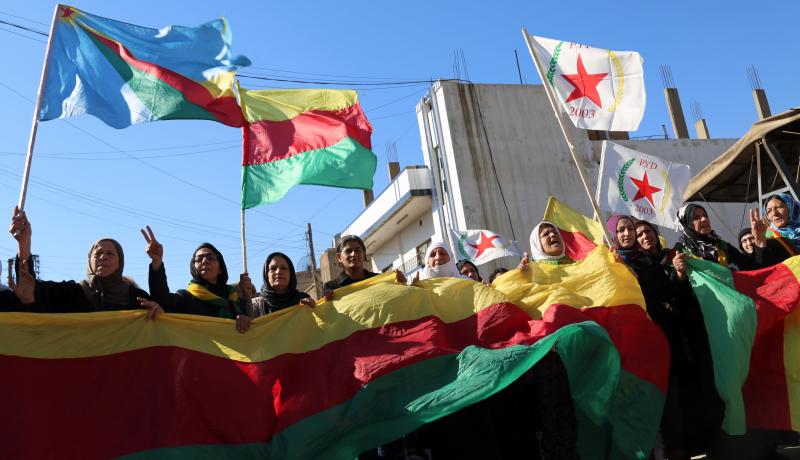
Recent events have indicated that some form of division of Syria is increasingly becoming a possibility. Earlier this week, the main Syrian Kurdish faction, the Democratic Union Party (PYD), declared a federal region in the areas they control in the north. Russia’s withdrawal of the majority of its forces appears to confirm that regaining regime control of the whole country was never Vladimir Putin’s objective. While spokesmen from both Russia and the US today said that only negotiations between Syrians can decide on whether the country will adopt a federal system, statements in recent weeks by American and Russian leaders have implied that a federal option could be put on the table at the Geneva talks. The exclusion of the PYD from the Geneva talks is partly responsible for the group’s unilateral declaration.
The rhetoric began in the context of negotiations between the US and Russia for implementing the cessation of hostilities. In late February, US Secretary of State John Kerry stated that 'it may be too late to keep it as a whole Syria if we wait much longer' and that if the Assad regime refuses to talk about a transitional government, then 'there are certainly Plan B options being considered'. In early March the Russian position was put forth when the deputy foreign minister said during an interview that they would not object to a federal Syria if this were to come out of the peace talks. These hints of being open to some kind of division of Syria have sent a strong message. Because sensitivities about the issue are so strong in the region, the recent political rhetoric about federalism or division in Syria is likely to be yet another factor working against the success of the peace talks.
The regional reaction to this message has demonstrated that any rhetoric about a divided model for Syria is inherently provocative. All other main Syrian factions have rejected the PYD’s declaration of their federal region. Regional powers, whether they back the regime or the opposition, were stressing the importance of Syria’s territorial unity even before the Kurdish declaration. On 5 March Turkish Prime Minister Ahmet Davutoglu visited Tehran, where he and his Iranian counterparts reportedly agreed on the importance of Syria’s territorial unity and the need to prevent northern Syria from becoming 'western Kurdistan'. Iranian President Hassan Rouhani defended Syria’s unity during a speech the following day, and the GCC also issued a statement to this effect on 9 March.
To some extent, the divide between international powers and regional powers involved in Syria is growing. Countries like the US and Russia are more likely to see federalism as a way to stabilize the nation by giving each party to the conflict (excluding the extremists) a 'piece of the pie'. Russia could also prefer a federal system which reduces the powers of a presidency because this would be a way to maintain Bashar al-Assad in that position in exchange for devolving certain powers to other groups. For Iran, Turkey and the GCC, however, federalism is a way to give autonomy to minority groups, which sets an unacceptable precedent for similar demands in their own countries or backyards.
Regional suspicions of federalism go further. There is also a strong sentiment, particularly within Syria, that devolving power on a geographic basis would set in motion an unstoppable trajectory towards formal partition. The chief negotiator for the Syrian opposition, Riad Hijab, has stated that 'any mention of federalism which might present a direction for dividing Syria is not acceptable at all'. While the opposition High Negotiations Committee signed up to the principle of decentralization at its summit in Riyadh in January, there were no details on what this would mean for governance and doubts remain about whether this reflected genuine commitment. In multiple recent, nationwide surveys nearly all respondents, pro- and anti-regime alike, rejected the idea of a divided Syria, although precisely tracking public opinion is subject to the challenges of the conflict situation.
These sentiments against devolution of power can be partly traced to memories of colonial divisions of territory and spheres of influence in Syria and the wider Arab world. While to international observers, the parallels may seem false and the context entirely different now than a century ago, this does not change the fact that perceptions on the ground are quite the opposite. Syrians are also likely to interpret the behaviour of international powers as a sign of intent to partition. For example, since the Russian deployment in September, US strikes have focused on ISIS targets in northeast Syria while the Russians have focused on securing the northwest and south.
There is no denying that international and regional powers will play an important role in someday ending this conflict. However, the way that potential governance solutions are currently being formulated risks making the majority of Syrians even more suspicious of international intentions and less likely to make concessions at the table that would require trust in the external mediators. Elements of the Western policy establishment, particularly in the US, are not helping matters by arguing in the media or in policy papers for a 'soft partition' of Syria as a way to stabilize military zones of control, institute a long-term ceasefire and improve conditions for peace talks. While these arguments may not be intended for a Syrian audience, Syrians are listening and many are presuming the worst.
It could someday be decided that a decentralized or federal system is the best way to shape a legitimate and just Syrian state. However, premature discussion of these concepts which for so many are equivalent to partition or secession will only make regional and local actors less willing to consider new ways to distribute power in Syria, or to accept additional Syrian factions such as the PYD at the negotiating table.
Doris Carrion, Research Associate, Middle East and North Africa Programme (Chatham House).
